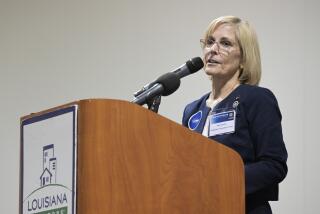GOP Sweeps 2 Governor’s Elections in South
- Share via
Republicans notched two big Southern election victories Tuesday, winning back the governor’s mansions in Kentucky and Mississippi.
In Kentucky, Rep. Ernie Fletcher swept past Atty. Gen. Ben Chandler, 55% to 45%, to break a 32-year Democratic grip on the governorship.
After a long night’s count in Mississippi, Haley Barbour -- a prominent Washington lobbyist and former chairman of the Republican National Committee -- defeated Democratic incumbent Ronnie Musgrove, 53% to 45%.
“Tomorrow is a day to move on and put this day behind us and get ready to accentuate the positive,” Barbour told the crowd gathered at his victory celebration at the Clarion Hotel in Jackson early today.
Bush campaigned for both Republicans over the weekend, elevating the stakes for the White House as attention turns to the 2004 vote. Democrats, for their part, sought to put a national stamp on the races by blaming Bush’s policies for the states’ slumping job markets and lagging economies.
“You have to say this is a bit of a tribute to the president,” said Hastings Wyman Jr., a nonpartisan expert on Southern politics. “It reinforces the idea of the president’s popularity and his party’s strength in the region.”
The twin victories extended a GOP winning streak that began four weeks ago in California with the recall of Democratic Gov. Gray Davis and the election of Republican Arnold Schwarzenegger to replace him.
With Tuesday’s results, the GOP will control 29 of the nation’s 50 governorships. The outcome also continues a reversal of recent Democratic gains in the South. In the past year, five Democratic gubernatorial seats have switched to Republicans in South Carolina, Georgia and Alabama in 2002, and now Kentucky and Mississippi.
“Republicans have strengthened their hold on their strongest region in the country,” said Whit Ayres, an Atlanta-area pollster who has done extensive political work across the South. “Democrats made a little run ... but Republicans have turned around and taken it right back.”
For all the national focus on Tuesday’s elections, it was local concerns that seemed to matter.
In Kentucky, Chandler labored under the shadow of term-limited Gov. Paul E. Patton, a fellow Democrat tainted by a scandal arising from an extramarital affair. Fletcher’s main promise was a vow to “clean up the mess in Frankfort,” the state capital.
Chandler, the grandson of former baseball commissioner and Kentucky Gov. A.B. “Happy” Chandler, sought to distance himself from Patton, pointing out his role investigating corruption in state government. He also took after the president, blaming the “Bush-Fletcher economy” for Kentucky’s job losses in recent years.
But Fletcher staunchly defended Bush, seizing in recent days on buoyant economic news out of Washington to suggest that the president’s tax cuts were having their desired effect. “I think our approach has worked,” Fletcher said.
In Mississippi, the campaign focused heavily on Barbour’s lucrative Washington lobbying practice and the many years he has lived and worked inside the Beltway. Democrats suggested that Barbour had lost touch with his home state and its people. Barbour countered that his Washington connections could help the state overcome its economic maladies.
Race was a factor in both contests. In Kentucky, Republicans came under fire for plans to post observers at largely black polling places. In Mississippi, Barbour was criticized for wearing a lapel pin bearing a Confederate logo. He also ran advertisements reminding voters of Musgrove’s support for an unsuccessful measure that would have removed the Confederate battle flag from the state banner.
Despite those idiosyncrasies, political pros in both parties kept a keen eye on the two states, hoping to divine some lessons to apply to 2004 -- or at least give their loyalists a psychological lift.
The predictive nature of off-year elections is decidedly mixed.
Democrats crowed about victories in the 2001 gubernatorial races in Virginia and New Jersey, then lost congressional seats in midterm elections a year later.
But other odd-year races have been more illuminating. The issue of abortion rights helped elect Democratic governors in Virginia and New Jersey in 1989, and went on to become an important issue in the 1990 elections. Health care helped elect a Democratic senator in Pennsylvania in 1991, and helped boost Bill Clinton into the White House in 1992.
For all the interest in possible national trends, Tuesday’s results were expected to have little practical effect on the presidential contests in either Kentucky or Mississippi.
Bush beat Democratic candidate Al Gore by double-digit margins in both states in 2000. Analysts said that barring a significant downturn in Bush’s political standing, they should remain safely in the president’s column next year.
More to Read
Get the L.A. Times Politics newsletter
Deeply reported insights into legislation, politics and policy from Sacramento, Washington and beyond. In your inbox twice per week.
You may occasionally receive promotional content from the Los Angeles Times.









